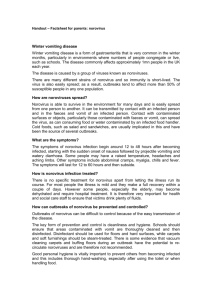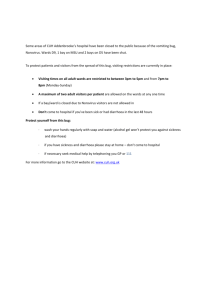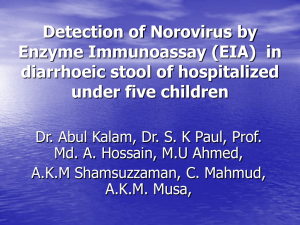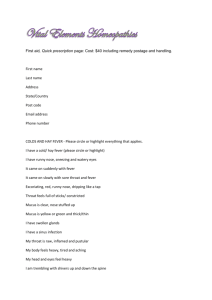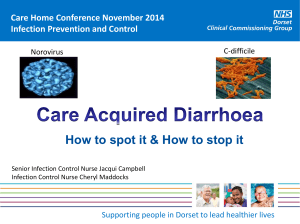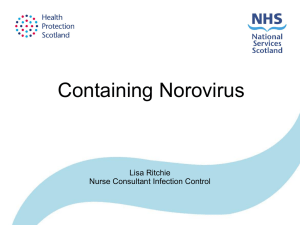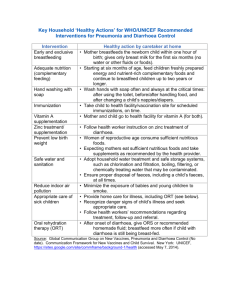School Outbreak: Diarrhoea & Vomiting Advice for Parents
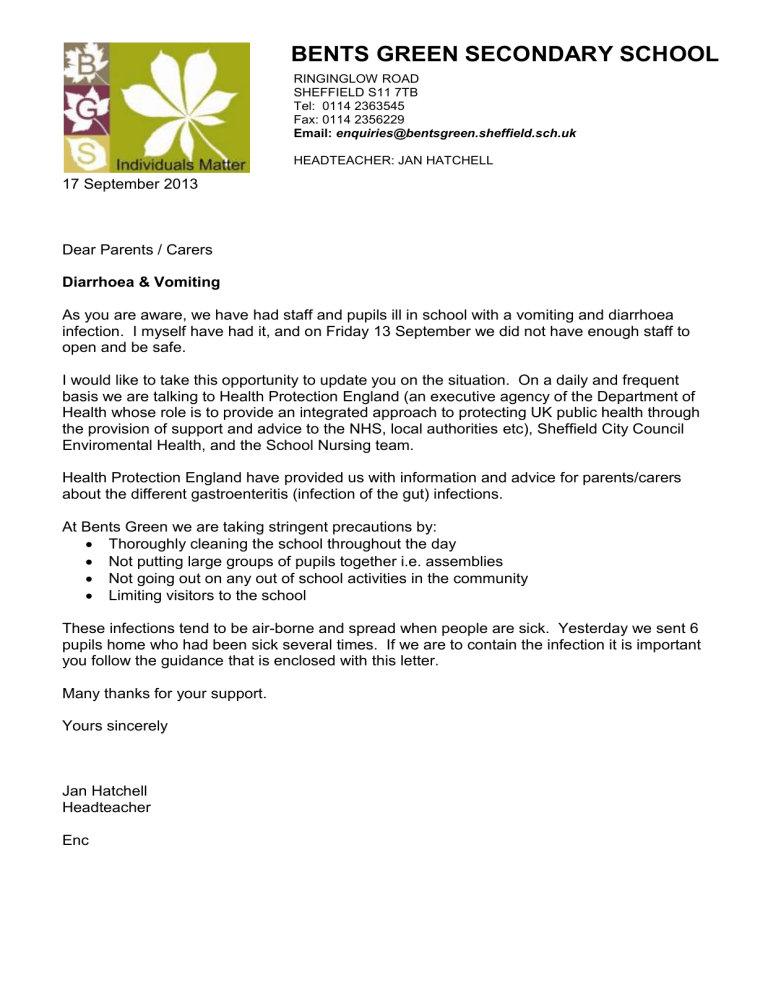
BENTS GREEN SECONDARY SCHOOL
RINGINGLOW ROAD
SHEFFIELD S11 7TB
Tel: 0114 2363545
Fax: 0114 2356229
17 September 2013
Dear Parents / Carers
Email: enquiries@bentsgreen.sheffield.sch.uk
HEADTEACHER: JAN HATCHELL
Diarrhoea & Vomiting
As you are aware, we have had staff and pupils ill in school with a vomiting and diarrhoea infection. I myself have had it, and on Friday 13 September we did not have enough staff to open and be safe.
I would like to take this opportunity to update you on the situation. On a daily and frequent basis we are talking to Health Protection England (an executive agency of the Department of
Health whose role is to provide an integrated approach to protecting UK public health through the provision of support and advice to the NHS, local authorities etc), Sheffield City Council
Enviromental Health, and the School Nursing team.
Health Protection England have provided us with information and advice for parents/carers about the different gastroenteritis (infection of the gut) infections.
At Bents Green we are taking stringent precautions by:
Thoroughly cleaning the school throughout the day
Not putting large groups of pupils together i.e. assemblies
Not going out on any out of school activities in the community
Limiting visitors to the school
These infections tend to be air-borne and spread when people are sick. Yesterday we sent 6 pupils home who had been sick several times. If we are to contain the infection it is important you follow the guidance that is enclosed with this letter.
Many thanks for your support.
Yours sincerely
Enc
Jan Hatchell
Headteacher
A Letter for Parents
To Parents/Guardians
Diarrhoea & Vomiting
This letter is to advise you of the diarrhoea and/or vomiting illness which is often present in the community at this time of the year and what you can do to reduce the spread of the infection.
What should you do if your child is unwell with diarrhoea and/or vomiting?
Make sure they get plenty of rest
Ensure they drink plenty of fluids, taking sips rather than gulps to avoid vomiting
Give infant Paracetamol or Ibuprofen, according to the product instructions, to help keep their temperature down
If your child is unusually sleepy, won’t take fluids or has other symptoms, such as blood in their diarrhoea, an unusual rash, headache, neck stiffness or difficulty breathing, ring
NHS Direct (08454647), contact your GP or take your child to hospital
Pl ease ring your child’s nursery/school and let them know that your child is ill and what symptoms they have
Please ensure that a stool specimen is submitted for your child via your GP. The ILog reference number 138791 should be written on the pot.
Keep them at home until they are well enough to return to nursery/school but ensure they have been at home for at least 48 hours after the first normal stool
How can you prevent the spread of these infections?
Hand washing is one of the most important ways to prevent the spread of these infections. This applies to the child who is ill and the person looking after them. Hands should always be washed with hot water and antibacterial liquid soap:
before and after caring for your child
after using the toilet
before eating or handling food
after cleaning up vomit, faeces or urine
Other ways of preventing the spread of infection are to:
do not share bath water
keep a separate towel for each family member who has symptoms
clean baths and washbasins thoroughly and disinfect after use, paying particular attention to the washbasin taps
disinfect the toilet flush handles and door handles
dispose promptly of used tissues and other items that your child may have coughed or sneezed on
wash soiled clothing, bed linen and towels separately in a washing machine, use the hottest wash for that fabric
If cleaning up diarrhoea or vomit, wash the surface with hot soapy water and disinfect before allowing to dry. If using bleach remember that it can remove the colour from fabrics and can burn the skin.
Keep your child away from other children and people that are particularly vulnerable, e.g. the elderly and those with long-standing illnesses.
If you require any further information or advice, contact Environmental Health Officer of your
Local Council:
Barnsley - Tel: 01226 773860;
Doncaster – Tel: 01302 737539;
Rotherham – Tel: 01709 823164
Sheffield
– Tel: 0114 2735774 or the Health Protection Agency Tel: 0114 2428850
GASTROENTERITIS ADVICE SHEET
WHAT IS GASTROENTERITIS?
Gastroenteritis is an infection of the gut caused by a variety of organisms (disease causing bacteria, viruses or parasites).
WHAT ARE THE SYMPTOMS?
You may develop one or more of the following symptoms: diarrhoea (which may contain blood and mucus), abdominal pain, nausea, vomiting, high temperature, headache, muscle aches.
IS THERE ANY TREATMENT?
See your doctor and ask for a stool test. This will show which germ is causing your illness and help decide what treatment you need. An Environmental Health Officer may either visit your home, contact you by telephone or post you some information to give you advice and support.
Most people recover without any specific treatment. However, drinking plenty of fluids is important, especially if you have diarrhoea and/or sickness. Your doctor may recommend a rehydration solution which is available from your chemist. Keeping well hydrated is particularly critical for babies, children, pregnant women and the elderly.
HOW COULD I HAVE CAUGHT IT?
Gastroenteritis can be caused by a range of germs which can affect people through a variety of routes. The following are the most common routes of infection:
person to person when somebody who has diarrhoea does not wash their hands
from eating contaminated food
from drinking contaminated/untreated water
contact with infected animals
HOW CAN I PREVENT THE SPREAD OF GASTROENTERITIS?
If you have any illness with diarrhoea and/or sickness, do not prepare or touch food prepared for your family or anyone else, until 48 hours after you have had your first normal stool.
Ensure all household members maintain good personal hygiene with regular hand washing and avoid sharing towels.
Younger children who are ill should be kept from mixing with other children to prevent the spread of infection. Do not go swimming if you have diarrhoea.
If someone in the household has diarrhoea and/or sickness, wash all dirty linen in the washing machine on the hottest cycle possible. Clean toilet seats, bowls, flush handles, taps and wash hand basins after use with detergent and hot water, followed by a household disinfectant.
WHAT ABOUT WORK/SCHOOL?
After recovery, you can return to work/school 48 hours after you have had your first normal stool.
HOW CAN I PREVENT BECOMING INFECTED IN FUTURE?
Avoid cross contamination of raw and cooked foods, especially meat and poultry
Raw meat and ready to eat food (e.g. cooked meat) must not be kept near each other in the fridge or on the work surfaces
Ensure raw food is never stored above cooked food in a fridge and that work surfaces are washed thoroughly with a disinfectant
Use separate chopping boards and knives for cooked and raw foods, especially meat and poultry
Cooking should kill most germs. All food especially poultry and meat, including hamburgers and sausage, should be well-cooked and not pink in the middle
If you are served undercooked meat, poultry or eggs in a restaurant, don’t hesitate to send it back to the kitchen for further cooking
If you reheat food including microwave ready meals, make sure it is piping hot throughout
Always wash your hands thoroughly:
Before and after preparing food
After going to the toilet
After cleaning the toilet
After cleaning a potty
After looking after anyone who has symptoms of diarrhoea and/or sickness
After changing a baby’s nappy
After any contact with animals
After touching soiled bedding or clothing
After gardening or touching soil
WHERE CAN I GET MORE INFORMATION?
This leaflet gives general information. If you require further details, please contact an
Environmental Health Officer at Sheffield City Council (Tel: 0114 273 4644/273 5774) or Health
Protection Agency (Tel: 0114 2428850)
If you have concerns about your health, contact NHS Direct on 0845 46 47, visit their website: http://www.nhsdirect.nhs.uk, or see your family doctor.
NOROVIRUS ADVICE SHEET
WHAT IS NOROVIRUS?
Norovirus is a term used for a group of viruses that are the most common cause of
Gastroenteritis (Infection of the gut) in England and Wales. In the past, Norovirus has also been called ‘winter vomiting virus’, ‘small round structured virus’ or ‘Norwalk-like virus’.
HOW DOES NOROVIRUS SPREAD?
Norovirus is found in the faecal matter and vomit of infected people. People can become infected with the virus in several ways:
eating food or drinking liquids that are contaminated with Norovirus
touching surfaces or objects contaminated with Norovirus (e.g. door handles) and then touching their mouth
having direct contact with another person who is infected and showing symptoms (e.g. when caring for someone with the illness)
The virus survives well in the environment, can easily spread from one person to another and only a very small amount of Norovirus is needed to cause illness.
WHAT ARE THE SYMPTOMS?
The symptoms start with the sudden onset of nausea followed by projectile vomiting and watery diarrhoea. Some people may have a raised temperature, headaches and aching limbs. The symptoms will begin around 12 to 48 hours after becoming infected and last for 12 to 60 hours.
There is no one specific group who are at risk of contracting Norovirus – it affects people of all ages. The very young and elderly should take extra care if infected, as dehydration is more common in these age groups. In general, children experience more vomiting than adults.
Most people make a full recovery within 1-2 days. However, some people (usually the very young or elderly) may become very dehydrated and require hospital treatment.
IS THERE ANY TREATMENT?
There is no specific treatment for Norovirus apart from letting the illness run its course. It is important to drink plenty of fluids to prevent dehydration.
ARE THERE ANY LONG-TERM EFFECTS?
No, there are no long-term effects from Norovirus.
IF I AM SUFFERING FROM NOROVIRUS, HOW CAN I PREVENT OTHERS FROM
BECOMING INFECTED?
You are still at risk of spreading Norovirus for 48 hours after your symptoms have stopped.
Wash your hands thoroughly after using the toilet and before eating or preparing food.
Avoid going to work or school for 48 hours after your symptoms have stopped.
Avoid preparing food for others for 48 hours after your symptoms have stopped.
Points that can be potentially touched by an infected person e.g., door knobs, toilet bowls, seats, flush handles, rails, taps, commodes and potties should be cleaned after each use using hot soapy water and disinfected with a bleach solution (1000 ppm).
WHY DOES NOROVIRUS OFTEN CAUSE OUTBREAKS?
Norovirus often causes outbreaks because vomiting causes widespread contamination of the environment where the virus is able to survive for many days and is easily spread from one person to another. A contaminated door handle can transfer the virus to at least 14 people who touch it one after another.
There are many different strains of Norovirus, people affected once are still at risk of catching it in the future.
Outbreaks are more likely to occur in semi-closed environments such as hospitals, care homes, schools and on cruise ships. Places where large numbers of people congregate for periods of several days provide an ideal environment for the spread of the disease. Healthcare settings tend to be particularly affected by outbreaks of Norovirus and 50% of susceptible people are likely to be affected.
HOW CAN THESE OUTBREAKS BE STOPPED?
Outbreaks can be difficult to control and long-lasting because Norovirus is easily transmitted from one person to another and the virus can survive in the environment for up to 7 days.
The most effective way to respond to an outbreak is to:
wash hands frequently
wash fruit and vegetables
if affected, avoid preparing food until 48 hours after symptoms stop
stay away from work or school for 48 hours after symptoms stop
dispose of food that may have been prepared by a contaminated person
flush vomit and faecal matter down the toilet and disinfect contaminated areas (vomiting causes widespread contamination of the area) with hot, soapy water and a bleach solution (1000 ppm)
More guidance is available for care homes and schools in dealing with suspected Norovirus outbreaks from Environmental Health at Sheffield City Council (Tel: 0114 273 4644/273 5774) or Health Protection Agency (Tel: 0114 2428850).
